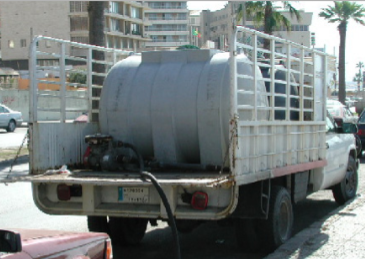Case-study /
CIRCE case study on the impact of climate change on Beirut


Mobile water trucks in Beirut
Greater Beirut is the largest urban area in Lebanon, with around 2 million inhabitants in the built up area. It is a densely populated area renowned for water shortages, with population growth and increasing demand from tourism and industry meaning that during summer supply is intermittent in many areas of the city.
The potential health implications associated with water shortages and deterioration in water quality constitute the key research issues for this case study. The potential pressures of climate change are set within the context of other serious social and environmental pressures such as high population growth rates coupled with poverty, a general lack of environmental awareness, limited access to clean water and sanitation and a drive towards industrialization with no environmental controls.
This case study will focus primarily on the assessment of the socio-economic implications of higher water demand and deteriorating water quality associated with climate change, and the development of adaptation and conservation strategies which take into account country-specific characteristics.
The University of Southampton was the CIRCE partner leading on this case study.
